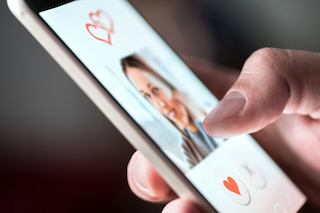 Dating apps are growing in popularity. In the U.S., online dating is a $3 billion industry and growing each year with predictions of 25 per cent continued growth into the year 2020. It seems everyone you talk to has tried or knows someone who has tried a dating app.
Dating apps are growing in popularity. In the U.S., online dating is a $3 billion industry and growing each year with predictions of 25 per cent continued growth into the year 2020. It seems everyone you talk to has tried or knows someone who has tried a dating app.
But are they for everyone?
A new study published in the Journal of Social and Personal Relationships aimed to answer that question by looking at how social anxiety and loneliness might impact someone’s dating app use.
“I had a suspicion that being socially anxious might lead to someone using dating apps more than people who weren't socially anxious, and that loneliness might make the problem even worse,” study author Katy Coduto of the Ohio State University told us. “So we decided to see if socially anxious people preferred meeting people online and if that, in turn, led to compulsive use of dating applications.”
You might be surprised to learn that it’s not just millennials looking for love. People aged 55 to 64 doubled their use of online dating apps from six to 12 per cent between 2013 and 2015. According to the American Association of Retired Persons, one in three adults aged 45 years and older consider themselves to be lonely and surfing the Internet is one of the ways that they cope with their loneliness.
Researchers theorized that social anxiety would lead to preferring online interaction in dating apps, which they then theorized would lead to compulsive use of dating apps. Researchers were guided by existing research on compulsive Internet use broadly, and so they decided to apply that broad theory to this specific instance of online use.
“I'm personally fascinated by relationship formation, how people find each other and develop a relationship with one another,” Coduto told us. “With dating apps in particular, I've been interested in how people use them, especially when I've seen people on dating apps at so many times- whether out to eat, or in class, at work, all of the time! I also feel like we hear a lot of ‘horror stories’ about apps, and I've never been convinced that they're all that bad. I had a feeling, though, that there could be some negative outcomes from using them, especially overusing them.”
Men use dating apps slightly more than women at 52.4 per cent versus 47.6 per cent. Are people honest in the way they describe themselves on the apps? Not really. About 53 per cent of people lie on their dating app profile. While 40 per cent of men say they lie about their current profession, 20 per cent of women post more flattering photos of themselves from when they were younger.
Researchers for the current study, surveyed 269 undergraduate students, asking them to rate how socially anxious and how lonely they were, if they preferred to use dating apps to interacting in person, if they compulsively used dating apps, and if they had experienced any negative outcomes from using dating apps. Researchers then analyzed the results by having social anxiety as a predictor of preferring online interaction, preferring online interaction as a predictor for compulsive use, and compulsive use as a predictor for negative outcomes. They then added loneliness into the mix to see if it made things worse.
“We found that people who are both socially anxious and highly lonely were the people who were most likely to experience negative outcomes from compulsively using dating apps,” Coduto told us. “This means that people who were both socially anxious and lonely were taking out and using their dating apps in class or at work and getting caught with them. Someone had to reprimand them for that use, for example.”
The results were what researchers predicted.
“It makes sense, since socially anxious people experience a fear of rejection in in-person conversations, and so we thought that they would be more likely to use dating apps and prefer them, likely because they feel safer,” Coduto told us. “They can control their image and manage everything down to the timing of messages sent. We also figured that lonely people would be more likely to use these apps, as they are trying to find quality connections and their loneliness typically arises from a deficit in quality relationships.”
Coduto thinks the big takeaway from the study is for socially anxious and lonely people to think about their use of dating apps.
“Be mindful of how much time you're spending on them, where you're using them, and if you should take a break from them,” Coduto told us. “I also think this research paves the way for more research on the topic of what makes these apps so addicting? Are there other personality factors that might make you more likely to use them compulsively?”
Coduto says dating apps are here to stay and that we should be encouraging healthy, purposeful use of the apps, as strategic use can lead to a variety of healthy relationships.
Patricia Tomasi is a mom, maternal mental health advocate, journalist, and speaker. She writes regularly for the Huffington Post Canada, focusing primarily on maternal mental health after suffering from severe postpartum anxiety twice. You can find her Huffington Post biography here. Patricia is also a Patient Expert Advisor for the North American-based, Maternal Mental Health Research Collective and is the founder of the online peer support group - Facebook Postpartum Depression & Anxiety Support Group - with over 1500 members worldwide. Blog: www.patriciatomasiblog.wordpress.com
Email: tomasi.patricia@gmail.com